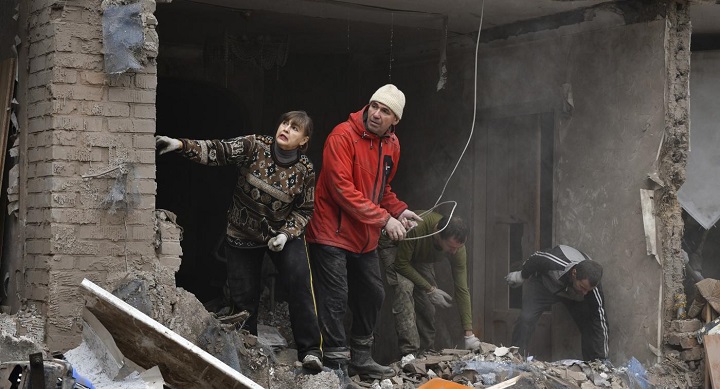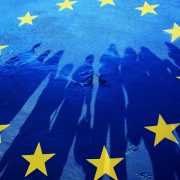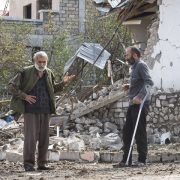
Russia’s invasion of Ukraine is recreating the bases of continental and transatlantic politics, but it is also helping to lay the foundation of a new system of values and traditions that unite more than yesterday a part of the world.
Act I, Germany
One of Russian President Vladimir Putin’s goals at the outset of the invasion of Ukraine was to split the European Union (EU) and the European continent in general into a stronger pro-Moscow, far-from-Washington front and a weaker pro-Washington front.
The former, in broad strokes, could have had three centers, Germany, Italy, and France; the latter would include the former Soviet countries plus possible groups of other Europeans. The latter would have buckled under the joint pressure from the east and west as it did many times in the past centuries in the pincer movement of German empires (Prussian or Austro-Hungarian) and the Russian Czars.
The plan, as it turned out, failed. But that does not detract from the fact that the fault lines in Europe continue to exist and may continue to widen beyond the end of the war in Ukraine.
Indeed, the Russian attack exposed a deep wound in German and European strategy over the past 30 years. In Berlin and Brussels, but also in Paris and even more so in Rome, they thought that politics, realpolitik, invented by the Germans as the name implies, had ceased to exist and only economics would dominate the world.
So, Germany made a double bet of tying itself to Russia for the cheap energy supply and to China as a manufacturing and market base. It was a political bet that might have been right 30 years ago, but was made without hedging the bets, without insurance.
That is, Germany, and by extension the whole of Europe that gravitates economically to Berlin, gradually stopped considering alternatives to political-economic investments in Russia and China. It gradually turned off substitute energy supplies and became increasingly dependent on the Chinese market.
The reasons were all reasonable and reasoned at the time, but today they are proven wrong, unfortunately for Germany and all of Europe, which is hooked to Germany.
Today, not only are Russian energy supplies at risk, but also the Chinese market. Unless China quickly and radically changes course, there will be economic decoupling with Beijing after the war in Ukraine, and Beijing is aware of it.[1]
Just as one can no longer gamble on energy supplies from “risky” countries, so “risky” countries like China can no longer be in the supply chain. Such decoupling will happen not only at the behest of the US, but because of increasing pressure from Asian countries that see a growth opportunity in luring investment away from Beijing. Also, any financial gnome in Zurich will increase interest rates and risk elements for China-related ventures.
This is the near future for Berlin, while already the present presses on. Double-digit inflation not only brings back panic scenarios from a hundred years ago, when the economic crisis was the spark that gave Hitler power, but is also a concrete reality. Only half of Germans own a home, and so inflation and rent increases affect them more than in Italy, where more than 80% own their homes.
This depends on many things, including higher property taxes in Berlin than in Rome, and a different propensity for private saving—less in Germany, more in Italy. It is perhaps also due to trust in the state—more in Germany, less in Italy.
This error of strategy then reaches deep into the cells of the German organism. So, while the Italians, more skeptical of the state, are more ready even psychologically to face a crisis, the Germans, more trusting of their government, are less so.
On the other hand, the history of recent decades has shown that Germany has not needed external aid, while other countries have needed it.
Then, what would other Europeans do in the face of a major, glaring German crisis? Perhaps nothing?
The two hundred billion gas fund launched by Germany out of the EU budget, and Berlin’s past resistance to a EU price-cap on gas, a response to the Russian blackmail strategies but also a possible pledge on a future China’s strategy, stem perhaps also from this tangle of feelings and perceptions.
Act II, The Poland-Ukraine Reign
On the other hand, former Soviet countries such as Poland or the Czech Republic feel vindicated in their anti-Russian militancy. Moreover, as John Pomfret documents in his From Warsaw with Love, Poland is very much tied to the US. Finally, Poland’s economy is vibrant, it is not in the euro-zone and, after the war, it could create a formidable political axis with Ukraine that would shift the balance in Europe, especially with Germany’s crisis.
With Germany’s crisis also goes France. And what happens to Italy, already weak in itself?
This then is not only a question of foreign policy choices, but also mixed with domestic policy choices. Poland and the Czech Republic, seen from Brussels, are drifting in an authoritarian direction, which Berlin and Paris do not like.
Such a drift seems to encourage extremist forces that have come close to power in France and may grow in Germany. It is extremely sensitive and touches on a raw nerve in Europe, firmly attached to its values of freedom and still scared of the ghosts of tyranny.
After all, October 28 will be the centenary of the March on Rome, when Mussolini took power in Italy. It will occur when for the first time in Republican Italy a post-fascist Giorgia Meloni is about to become Prime Minister.
This is a coincidence that does not escape those in Europe, and incites caution despite all the cautions and attentions of Meloni herself.
Luca Ricolfi is right, in his October 10 article in La Repubblica, that the burning issues for the next Italian government are economic ones rather than of values. Meloni will probably have to secure extra support from Brussels in the coming months. But with the German political-economic crisis, funds issues may also become values issues.
For the first time in many years, this objectively gives great balancing powers to Italy, but with this power also comes enormous responsibility.
Indeed, one must help Germany with all possible forces to find a new political-economic horizon and at the same time not ostracize Poland but help it to fully reenter the European fold. These two things alone call for a profound rethinking of Europe.
Such rethinking cannot fail to come through a deep discussion with Washington as well. Indeed, many of the EU’s strategic mistakes in Ukraine have passed through the distance that has been created in the transatlantic relationship.
Act III, Values
Here is the third act of the drama, the issue of values. They deeply split American and European society, and this tectonic fault line is perhaps the great line of continuity and union across the Atlantic, given that issues of values sometimes appear as incomprehensible to Asia as, for example, colors to colorblind people.
A unified transatlantic geopolitics might dictate that they be skipped over, but this is impossible given how deep-rooted and profound the issues are. Moreover, some essential elements, such as questions of freedom, ranging from the person to politics to the market, and the limits of that freedom, are fundamental even among less free societies.
Then it is necessary to look at ourselves, American-Europeans, at least a little bit.
God, Country, and Family have been the three sides of the conservative-reactionary triangle that has marked the European right for at least two centuries, from the times on the 1789 French Revolution to the 1989 fall of the Berlin Wall.
Last century the combined assault of communist atheism and fascist neo-paganism attempted to abolish God.
Under similar thrusts, Country was declared null and void by communists in the name of a proletarian neo-universalism that put everything under Moscow’s command. Or it was taken to extremes by those who saw only their own Countries and ignored the rights and needs of the Countries of others.
The patriarchal family ended because of the simple universal emancipation of women, which continues and will continue to move the needle of family balance.
Now the great communist momentum is over, one feels lost in a world that changes at ever-increasing speed, and the desire for values and traditions that apply to all has returned.
One problem is of course what values and traditions are involved. Are African, Chinese, Indian, European, and Arab values all the same?
If they are all the same, the world becomes atomized. There are no more judgments, no more rules, and therefore there is a lack of communication. It is anarchy based on the power of the strongest. The enforcement of “Western values” is practically impossible; nobody will accept them, not even Westerners. Besides “Western values” perhaps exist only in the mind of those campaigning against freedom.
What is needed instead is a practical basis for dialogue. In fact, this is already beginning to occur.
God is back. Whether it is the intolerant one of the fundamentalists or the merciful one of Pope Francis, temples and churches may be empty, but atheism is no longer theorized. The hatred against God that began with the French Revolution has ended. Then since God is back, in practical preference, most people, without suicidal mania, will choose the merciful God of the Pope to the intolerant one of religious Fundamentalists.
Communist universalism is over, and there is no room for a Country that tramples on the Countries of others, as the Russians tried to do against Ukraine. If the Russians could not do it, others are even more unlikely to succeed. Instead, there is a return of a Country that aligns its interests with those of the world.
With regard to the family, the old patriarchal tyranny is no more, but there is a new desire for a core of affection that coalesces around a couple with children. The fact that LGBT people want the right to marry is evidence of the return, the strength of the family. That said, children adopted by LGBT couples, surrogate pregnancies, easy abortions, and contraception are displacing the old contiguity between sex and reproduction and the patriarchal family.
Yet in days gone by, the contiguity between sex and reproduction was paid for with clandestine abortions, children not recognized by their fathers, and children given as servants to the homes of the rich. Having mommy and daddy was a fortune. Now that it is easy to have a “normal” family, to do without it seems like a slap in the face of misery.
Of course, this appears to be against nature. Then again, a population that has exploded in a century from one to eight billion, with an average life span that has since doubled from less than 40 years to nearly 80 years, is just as “unnatural.”
The truth seems to be, at least with an Asian eye, that “tradition” is already returning, but it is readjusting to different parameters than those used before the French or Soviet revolutions. In short, in many of the “newist” demonstrations there is no desire for upheavals like those of the last century, fascist or communist. It is neo-traditionalism. Even in “woke” demonstrations that deny “white culture,” it is to establish another culture.
Here the discriminator is not black or white, red or green culture; it is yes or no culture. Those who oppose the study of Greek classics should be given Chinese classics, or Indian classics, or Mayan hieroglyphics to study. And yes, no culture, should be forbidden.
Knocking down and rebuilding statues is part of Western culture. They are the iconoclasm that has plagued Christianity for centuries and still torments the Muslim world, as we read in Orhan Pamuk’s My Name is Red. Nothing new under the sun—it is part of our tradition.
The essence of this tradition, beyond daily polemics, is deeply cemented on both sides of the Atlantic and projected into the future if and insofar as a synthesis, however shaky, can be found.
The extreme, “neo-czarist” position advocated by Moscow and its Western followers, on the other hand, is destined to disappear, defeated by war, as happened to fascism after World War II or communism after the Cold War.
This then comes with the transformation of the Muslim world, which is looking culturally and religiously more toward a dialogue with the Holy See and politically and economically toward a relationship with Israel.
The ongoing crisis in Iran, contemporaneous with the Russian crisis, seems to point to another aspect of this profound transformation, the shift and marginalization of the more radical Islam that has exploded precisely since the Khomeni revolution in Tehran 40 years ago.
This ongoing change then poses very important cultural, political, and economic opportunities and challenges to Asia, home to 60% of the world’s population.
One question above all goes to China: If Moscow, part of European culture, has not succeeded in politically and culturally splitting Europe and the transatlantic relationship, could Beijing succeed?
And if it cannot succeed, what strategies can China adopt to deal with its near future to avoid dangerous isolation?
From these answers, post-war Ukraine could really begin.
[1] See Zongyuan Zoe Liu China Is Hardening Itself for Economic War https://www.tbsnews.net/analysis/china-hardening-itself-economic-war-442278





